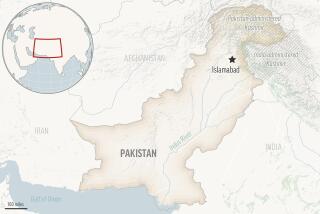Pakistan bombing may be retaliation
- Share via
ISLAMABAD, PAKISTAN — Senior Pakistani officials said Wednesday that they thought Islamic militants were responsible for a suicide bombing at an army training base that killed at least 42 soldiers and injured about 20 others.
If those suspicions prove true, it would be the deadliest such attack against Pakistan’s military, which is allied with the United States in the search for figures connected to the Al Qaeda terrorist network.
No group claimed responsibility, but militants had promised to avenge a military raid on an Islamic religious school last month that killed about 80 people.
Pakistan’s government said most of the dead in the Oct. 30 helicopter attack were militants receiving training. Authorities at the religious school, or madrasa, said most of the victims were students with no ties to any radical group.
Wednesday’s suicide bombing was at a base in Dargai, about 85 miles northwest of Islamabad in the restive North-West Frontier Province, which borders Afghanistan.
The army said in a statement that a lone attacker, wrapped in a cloak, rushed into an unfenced training area and blew himself up among several hundred soldiers beginning their morning calisthenics. Many were new recruits in their teens.
Speaking to reporters in Islamabad, the capital, Information Minister Mohammed Ali Durrani called the suicide attack a “contemptible act.”
A witness, Lal Zaman, told the Associated Press of seeing severed limbs, bloodied boots and bits of torn uniforms on the training field.
Troops launched a manhunt for suspected accomplices, the army said, but no arrests were immediately reported.
Officials said Dargai was known to be a center of activity for the banned Islamic group Tehrik-e-Nifaz-e-Shariat-e-Mohammadi, or the Movement for the Enforcement of the Laws of Muhammad, whose members were dispersed throughout the tribal regions bordering Afghanistan.
One of the group’s senior leaders was killed in the madrasa raid in the Bajur tribal district, drawing pledges of retaliation from surviving leaders. Pakistani officials said intelligence data indicated that the group had made good on the threat.
Interior Minister Aftab Khan Sherpao said the suicide attack on the base was “linked to the Bajur incident.”
The banned group, which seeks to impose a Taliban-style social system, sent many of its adherents into Afghanistan to fight American troops in the aftermath of the Sept. 11 attacks.
President Pervez Musharraf condemned the suicide attack and promised to “deal with it very forcefully,” the Information Ministry said.
The White House, which has been pressing Musharraf’s government to mount a more vigorous drive against Islamic militants, on Wednesday praised the Pakistani military campaign, which is bitterly opposed in tribal areas.
“We applaud the government of Pakistan’s determination and resolve to fight against terror,” National Security Council spokesman Gordon Johndroe told the Reuters news agency.
Analysts said the attack on the base could represent a troubling change in tactics by anti-government militants. Unlike in Afghanistan, suicide bombings have been relatively rare in Pakistan.
“It is a new phenomenon here, and previously was used for sectarian violence,” said Rasul Baksh Rais, a political analyst at Lahore University.
*
Times staff writer King reported from New Delhi and special correspondent Zaidi from Islamabad.
More to Read
Sign up for Essential California
The most important California stories and recommendations in your inbox every morning.
You may occasionally receive promotional content from the Los Angeles Times.










